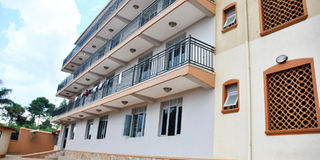Keeping your apartment block free from coronavirus disease

People living in close proximity need to combine efforts to fight the spread of coronavirus. FILE PHOTO
What you need to know:
- Residents that share space and amenities should take steps to limit the possibility of transmission. They should consistently clean and disinfect surfaces that are touched by everyone such as door handles and elevator buttons and gyms equipment, among others.
Apartment block residents run the risk of community spread infection, especially those that share many emenities. A deliberate and systematic plan will help landlords and property managers prepare their tenants well thus preventing unncessary panic.
David Walusimbi, a property manager, notes that all it takes to create panic on an apartment block is just a rumour of an infection. He advises property owners to avail the appropriate information about the spread and prevention of the virus to their tenants as a way of protecting their investment.
“Do not wait for an outbreak to start. What you need as a manager or landlord is a disaster and emergency plan in case of an outbreak on your property. We need to protect ourselves using any measures available to us,” Walusimbi advises.
He recommends liasing with health officials and a legal team to come up with guidelines regarding evacuation in case of an infection.
“This is a complex issue to handle and therefore, needs the input of all the authorities concerned. Ordinary tenant agreements do not require tenants to disclose illnesses. But in case of a covid-19 infection, we do not want others in the building to be infected yet we also might not have a right to tell someone with the virus to leave,” Walusimbi says.
Maintain hygiene
Dr Raymon Baluku, a general practitioner, urges people to follow the guidelines given by the government and the World Health Organisation.
“Health experts have empasised the importance of maintaining good personal hygiene, especially washing hands and avoiding touching our faces. Let us follow these guidelines whereever we are, even in our homes,” Dr Baluku urges.
He says the coronavirus is transferred by droplets from coughs and sneezes that can come from another person’s cough to their hand, to your hand, to your face.
“If a resident is confirmed to have or is believed to have 2019-nCoV, immediately call the coronavirus emergency numbers (+256 800 203033 and +256 800 100066, both toll-free lines) and notify health officials who will give you appropriate measures to take,” he advises.
Baluku urges residents who are feeling sick to stay at home and keep a distance of two metres from others. He also advises them to wear surgical masks to prevent infection. Stay away from older people and those with pre-existing condtions,” the doctor advises.
Sanitise the house
Dr. Baluku recommends every individual cleaning their own homes properly every week.
“This is more than the usual general cleaning, this involves the use of disinfectants and sanitisers all around the house. If you do not have money to buy the supermarket disinfectants make some for yourself using kitchen products such as lemon, baking soda and vinegar which have been proven to kill germs,” he advises.
He also advises diligently cleaning and sanitising surfaces that are most touched by residents such as handrails, door handles and light switches, among others.
Walusimbi says building managers and owners in addition to limiting the possibility of transmission, are responsible for creating a safe atmosphere for their residents and staff.
“A week ago, we displayed fliers with guidelines from the World Health Organisation. We asked residents permission to disinfect their homes. Some said they could do it on their own but we asked our cleaners to supervise the process,” reveals Walusimbi.
Walusimbi says they have provided liquid disinfectant and sanitisers to all residents and we are encouraging them to be each other’s keepers.
“There is power in togetherness. So we are working with our tenants to ensure community safety during this difficult time. Where common sense fails we are willing to apply force. For instance we have directed the security guards not to allow anyone to enter the apartment block without first using the sanitiser at the gate,” the property manager says.
Minimise contact
Residents become a close-knit community where children spend a lot of time together and in each other’s homes. Walusimbi says they have encouraged families to restrain this interaction to the minimum.
Keep shoes and sandals that you wear outside, preferably outside the house, especially if there are small children in the house who may pick these up with their hands. Do not hesitate to ask visitors to take off their shoes when they come over.




